Learn the best way to clean paint brushes that have hardened using natural ingredients without a chemical cleaner!
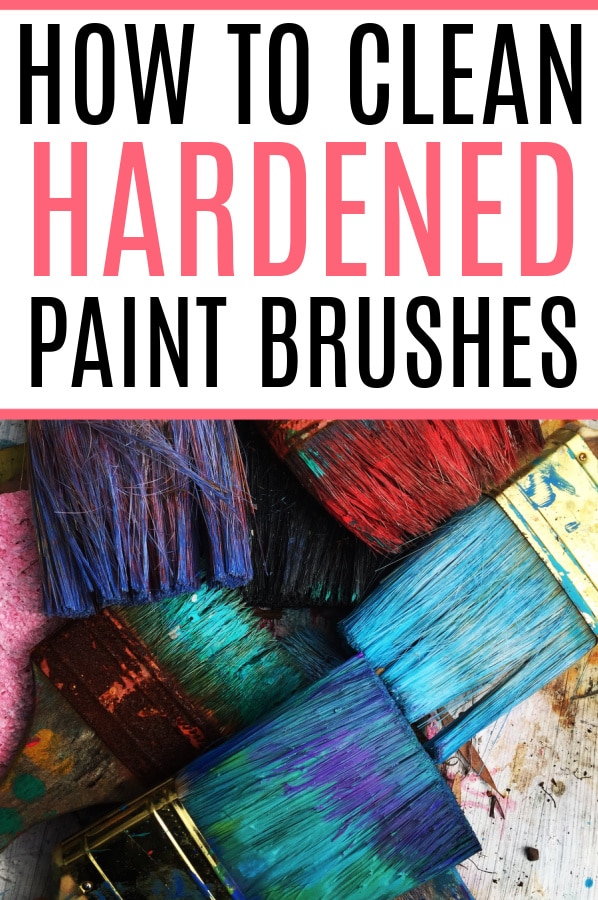
I try to be really good at cleaning my paint brushes when I am done with a paint project. Unfortunately, occasionally the brushes get put up when they still have some paint on them. Then you know what happens.
This little trick trick works great on water-based paints, chalk paint, and latex paint.
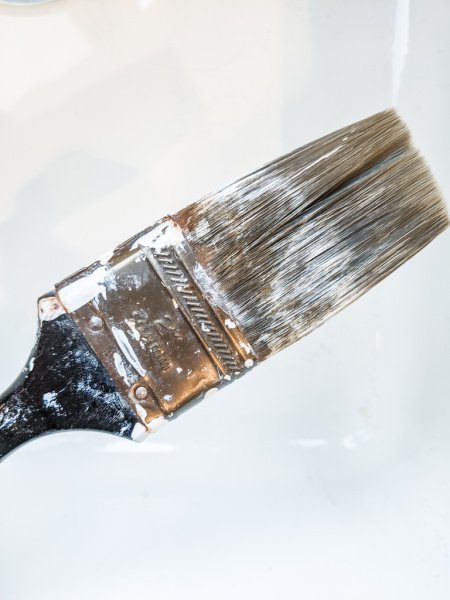
Supplies Needed
- White Vinegar
- Tray or clean container to put brushes and vinegar in
- Old toothbrush or scrubber
- Brushes with hardened paint
You will also need a way to heat the vinegar. I just use my teapot, but you could also use a pot on the stove.
Below is my brush before I soaked it in vinegar. You can see how the bristles have dried, hardened paint through them.
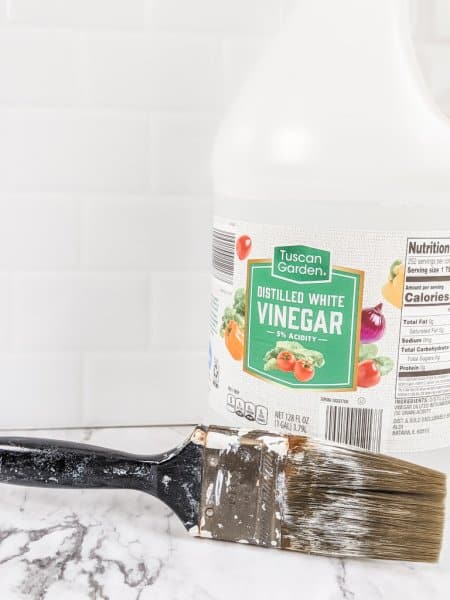
How To Clean Hardened Paint Brushes
STEP 1: Heat enough cups of vinegar in a tea kettle or small pot over the stove to fully cover the dried paint brushes in the tray you will use.
STEP 2: Add the dirty brush to the tray, then slowly pour the warm vinegar over it. Ensure the bristles are completely submerged.
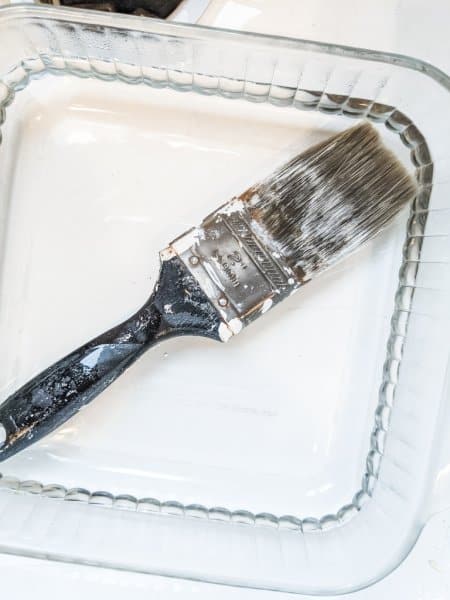
STEP 3: Allow the brushes to soak for 10 minutes.
STEP 4: Use an old toothbrush, brush comb, or wire brush to scrub off the excess paint.
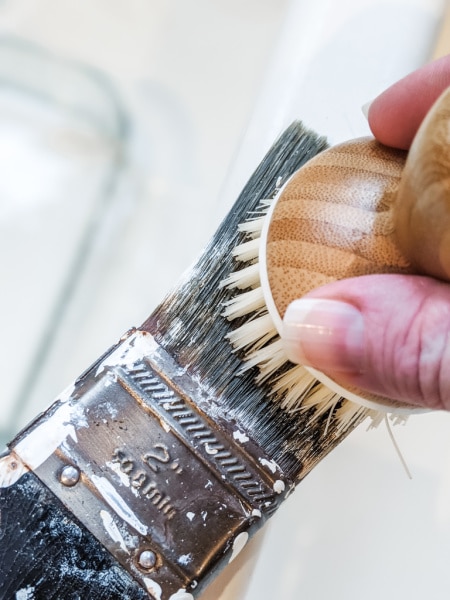
STEP 5: After scrubbing, place the brushes back into the vinegar and soak for another 10 minutes.
STEP 6: Scrub the brushes once more and rinse thoroughly with hot water.
STEP 7: Brush the bristles gently across the palm of your hand to remove excess water.
STEP 8: Let the brushes air dry flat or store them in brush holders in an upright position to maintain their original shape for future use.
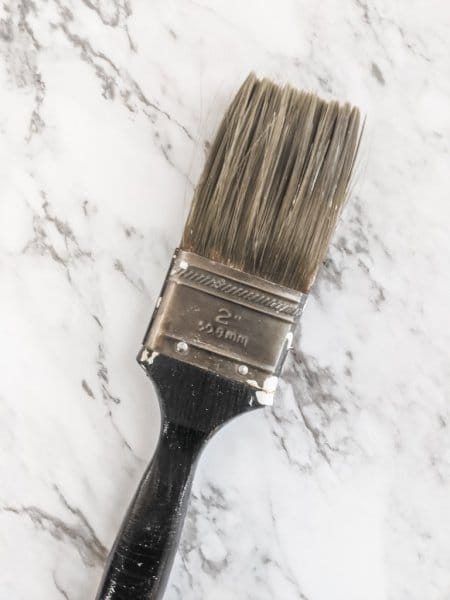
Helpful Tips
- Gently take the scrubber over the paint brush bristles. Make sure you keep in the one direction of the bristles so you don't bend or break them. If you don't have a shallow tray, you can also use a plastic bag (Ziploc).
- When there is still too much paint let, repeat the process or let them sit to the next day.
- These simple steps will show a big difference, especially if the brushes are still in good condition. Old brushes or ones that have set for a really long time may need to be tossed.
- I recommend keeping your brushes separated depending on the type of paint you are using. This is an easy way so you can clean them all at once using the appropriate solvent or cleaner.
- For those who are using high-quality paint brushes for specific projects, check the manufacturer’s instructions first for best results on how to clean and maintain them.
Common FAQs
No, vinegar is gentle on most brush bristles. However, avoid soaking for extended periods, as it may weaken natural brushes over time.
Dip a cloth or sponge in vinegar and wipe down the metal ferrule and brush handle to remove paint residue and restore shine.
No, a vinegar soak will not effectively clean brushes covered in oil paints. Vinegar is useful for cleaning brushes with water-based paints or for softening dried paint, but oil-based paints require a solvent to break down the oils.
What to Use Instead:
Mineral Spirits or Paint Thinner: These are the go-to solutions for cleaning oil-based paint from brushes and can be found at Lowe's, Home Depot, or your local hardware store.Pour a small amount or lacquer thinner into a container.
Swirl the brush in the solvent to loosen the paint.
Wipe the brush on a clean cloth or paper towel, then repeat as necessary.
Linseed Oil or Baby Oil: These can also help to clean oil-based paint while being gentler on the bristles. Follow the same steps as above.
After cleaning with a solvent, wash the brush with warm soapy water to remove any residual chemicals. Then, reshape the bristles and let the brush air dry.
When working with a chemical brush cleaner, always stay in a well-ventilated area due to the fumes and never pour solvents down the drain.
Murphy's Oil Soap can be somewhat effective at cleaning oil paint brushes if the paint has not hardened too much. It is gentle on brush bristles and works well as a general cleaner, but it is not as strong as dedicated solvents like mineral spirits or paint thinner.
However, for best results, use on semi-dry or freshly covered paint brushes.
You can also use Murphy's to clean residual solvent and it acts like a fabric softener to the bristles to condition.


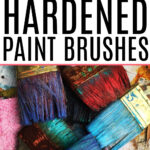
Carolyn Pollock says
Would this work for chalk paint as well?
Julie says
I haven't tried to clean chalk paint from hardened paint brushes, but I think it should work just the same.